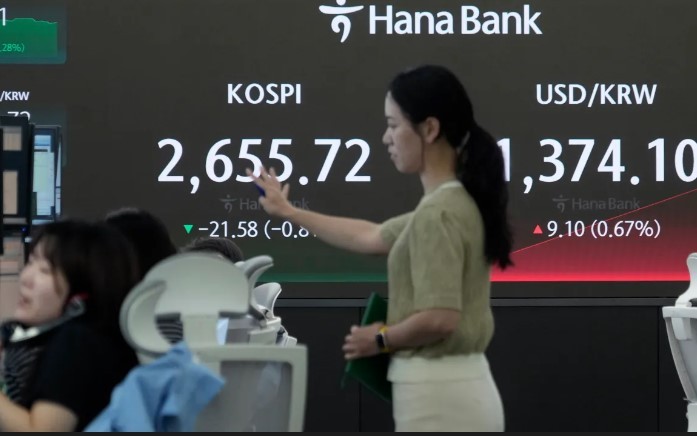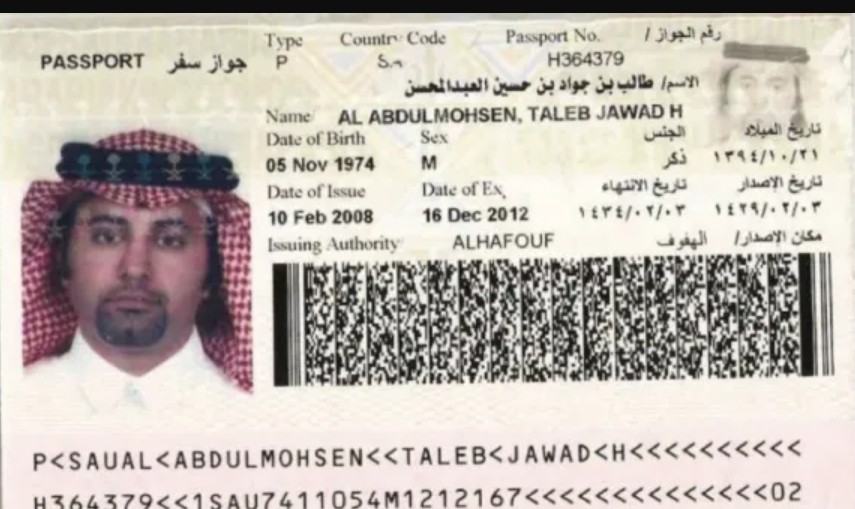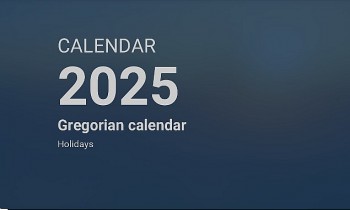2025 Poland Calendar - Full List of Public Holidays And Observances
An Overview of Public Holidays in Poland
Polish citizens have the chance to commemorate important historical events and traditions through public holidays, which play a vital role in the country's social and cultural life. New Year's Day, Easter, Labor Day, Independence Day, and ten more national holidays are observed in Poland.
Polish traditions, customs, and community events abound during these holidays, which pay homage to the country's long and illustrious history. To ensure that staff leave planning is in sync with national observances, employers must grant paid leave to employees on these public holidays.
Learn more: 17 Cool Facts about POLAND Would Blow Your Mind
Full List of Public Holidays And Observances in Poland for 2025
New Year's Day
January 01, 2025, Public Holiday
New Year’s Day, on January 1, is the first day of the year and a public holiday in Poland.
There are a lot of fascinating New Year's customs in Poland. Like everywhere else in the world, there will still be fireworks, family feasts and parties, and staying up until midnight for a toast. However, Poland is also home to many ancient customs.
In Poland, New Year's Eve is known as "Sylwester," and festivities include hayrides through the woods, bonfire roasting of sausages and other food, and a large meal consisting mostly of leftovers from the previous Christmas season. In Poland, the period from New Year's Eve to Lent is traditionally spent attending balls and having parties.
Poles have a long-standing custom of waiting until midnight on New Year's Eve and eating a pickled herring for good luck in the coming year. They might also eat bread rolls shaped like cows, rabbits, and other animals, as well as poppieseeds. Additionally, consuming donuts or any other food shaped like a ring is thought to ensure a fortunate new year.
Three Kings’ Day
Mon, Jan 6 Bank Holiday
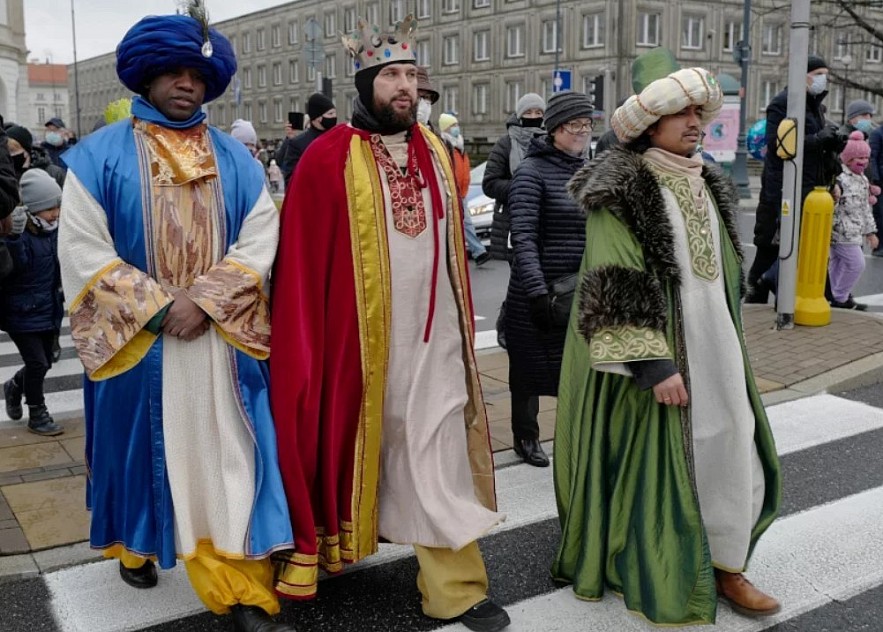 |
| Three Kings’ Day in Poland |
During the Communist era, there was no celebration of Three Kings' Day. In 2011, it was reinstated as a recognized public holiday.
One of the three main Christian holidays, along with Christmas and Easter, Epiphany is overshadowed by falling so soon after Christmas.
It honors the occasion when the three wise men, or Magi, presented the infant Jesus. It is always observed on January 6. 'Three Kings Day' is another name for it in certain nations.
Children may go outside on the eve of Three Kings Day, gather grass, and place it in a shoebox beneath their beds before going to bed in the hopes that gifts will replace the greenery. The grass would be scattered all over the floor in the morning, indicating that the Three Wise Men had arrived in the night with their corresponding camels to bring gifts.
In Poland, a Three Kings Parade has grown to be a highlight of the celebration. The inaugural procession happened in 2009. It was made to carry on the tradition of a Warsaw school's nativity play. The ceremonial procession is based on similar parades that happen in Spain and Mexico, but it originates from the native tradition of nativity plays and carolling.
Participants in the parades make their way through the towns and villages' streets behind the Star of Bethlehem. A booklet containing Christmas carols and vibrant paper crowns are distributed to each participant in the parade, and they all sing carols while they move. Everyone in attendance bows down before Jesus and the Holy Family as the Three Kings lead the procession to the stable.
Epiphany
January 06, 2025, Public Holiday
Poland observes Epiphany, also known as the Procession of the Three Kings, on January 6 of each year as a public holiday.
The reason behind the celebration of Epiphany is that it is believed to be the day that the Eastern wise men arrived at the crib of the baby Jesus in Bethlehem. For this reason, it is occasionally referred to as "Three Kings' Day" in Poland and other nations.
On this day, there are numerous Epiphany processions across Poland, where participants don costumes or represent the Three Kings. In Warsaw, a significant procession usually happens along the "Royal Route."
Some people will write "CBM" just over their front door using chalk that has been blessed by their priest. The three letters stand for the alleged names of the Three Wise Men: Melchior, Balthazar, and Caspar.
Valentine's Day
Fri, Feb.14, 2025, not a public holiday
 |
| Valentine's Day |
Many Polish people celebrate Valentine’s Day (Walentynki), a day associated with romance and love, on February 14.
Valentine's Day is not a public holiday in Poland. Businesses have normal opening hours.
Easter Sunday
April 20, 2025, Public Holiday
Easter Sunday is a public holiday in Poland to celebrate Jesus Christ’s resurrection.
Easter Sunday is the most important date in the Christian church.
According to the Bible, this is the day that Mary Magdalene discovered an empty tomb in the cave where Jesus had been buried after his crucifixion the Friday before.
As the 40 days of Lent come to an end, Christians who abstained from something to symbolize Jesus' time in the wilderness can now indulge.
The church bells, which were silent during Lent, will ring again on Easter Sunday.
Without a doubt, Easter is one of the most important holidays in Poland, marked by jubilant celebrations and intense religious observance. Polish people participate in Easter Sunday feasts that include traditional foods like ham, sausage, and pierogi (dumplings) as well as special church services.
Egg-rolling competitions between friends and the exchange of beautifully decorated eggs are other traditions associated with the holiday. For Poles, Easter Sunday and Easter Monday offer a two-day break to celebrate and spend with family and friends.
Good Friday
April 18, 2025, Observance
Good Friday, the Friday before Holy Saturday, Easter Sunday (Wielkanoc), and Easter Monday, is observed by numerous churches in Poland. The Christian bible tells the story of Jesus Christ's passion, crucifixion, and death, which is remembered on Good Friday.
Poland does not observe Good Friday as a public holiday. Companies open for business during regular hours.
Holy Saturday
April 19, 2025, Observance
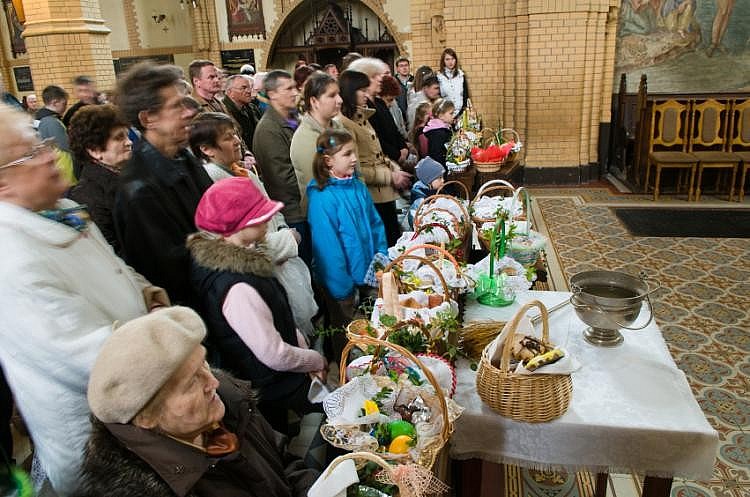 |
| Holy Saturday 2025 in Poland |
In Poland, a lot of churches celebrate Holy Saturday. It is the day before Easter Sunday (Wielkanoc), which honors Jesus' resurrection, and the day following Good Friday, which remembers his death.
Holy Saturday is a working day even though it falls on a Saturday in 2025. In Poland, most companies operate during regular business hours.
Easter Monday
April 21, 2025, Public Holiday
Poland observes a public holiday on Easter Monday, the following day after Easter Sunday. The resuscitation of Jesus Christ is commemorated on both days.
This day is called "Little Easter" in a lot of European and South American countries. It is referred to as the "Monday of the Angel" in the Catholic Church.
Many regions used to celebrate it as Easter Week, but by the 19th century, it had been shortened to just one day.
Labor Day / May Day
May 01, 2025, Public Holiday
Poland observes Labor Day as a public holiday on May 1. Constitution Day falls on May 3rd in Poland. Many people observe a long weekend known as "Majowka," or "the May holidays," by taking off work on May 2nd or even earlier.
During "The Second Republic," the years between World Wars I and II, Poland observed Labor Day for the first time. Leftist and Communist organizations loved to march on this day and hold demonstrations. For the Communist leaders of the nation, May 1st was a major holiday when it was still a satellite state of the Soviet Union.
Labour Day was celebrated even after Poland's Communist regime was overthrown, albeit without the ostentatious military parades of the past. Today, the majority of Poles simply take advantage of a few days off work to enjoy the fresh springtime air and scenery, go to any special events that catch their eye, and relax.
Day of the Flag
May 02, 2025, Observances
Day of the Flag is not a public holiday in Poland. Businesses have normal opening hours.
Constitution Day
May 03, 2025, Public Holiday
Constitution Day in Poland is always celebrated annually on 3 May.
In Polish, it is known as 'Swieto Trzeciego Maja', which means 'National Third of May day'.
Constitution day marks the declaration and adoption of Poland's first constitution on 3 May 1791.
The American constitution from 1789 is the oldest in the world, with Poland's constitution being the first to be ratified in Europe. The Polish constitution was first drafted in 1788.
The French Revolution served as inspiration for the foundational ideas of the Polish constitution, which established a constitutional monarchy.
The 'War of the defense of the constitution' broke out between the commonwealth and conservative nobility supported by the Russian empire as a result of the constitution's implementation, which was applicable to the Polish-Lithuanian commonwealth.
As a result, the constitution was revoked in less than 19 months, but the 3 May constitution is still remembered as a significant turning point in Polish history.
This day was declared a national holiday in 1918 following the country's independence, but unlike many other holidays, it was not observed during the communist regime.
The Act of 6 April 1990 reinstated the holiday after the fall of the Soviet Union, and on May 3, 1990, President Wojciech Jaruzelski presided over the first grand celebration in Warsaw's Castle Square.
Pentecost Sunday
Sun, Jun 8 Bank Holiday
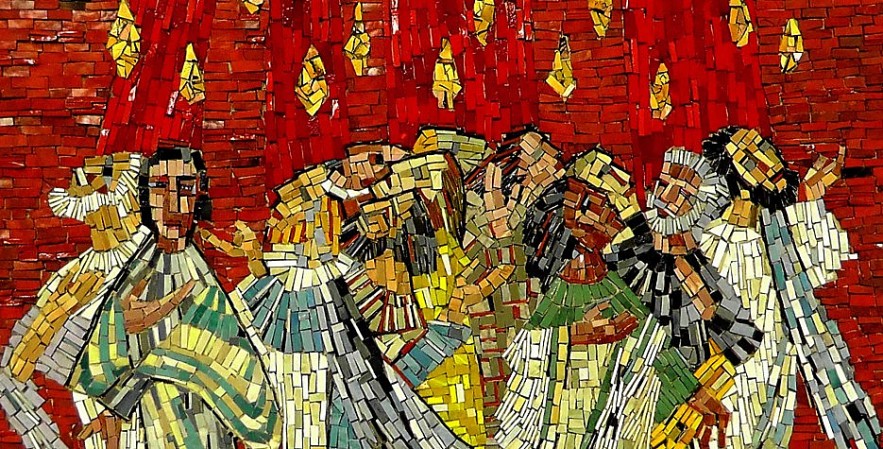 |
| Pentecost Sunday |
Pentecost is celebrated on the seventh Sunday following Easter and ten days following Ascension. It is also referred to as Whit Sunday or Whitsunday. The term "pentekoste" in Greek means "fifty," since Pentecost Sunday falls on the 50th day of Easter.
This day is a moveable feast because it is based on Easter. Pentecost Sunday can occur on May 10th (as in 1818) at the earliest possible time and on June 13th (as in 2038) at the latest.
It signifies the conclusion of the Easter cycle, which started on Ash Wednesday, the first day of Lent, ninety days ago.
Mother's Day
Mon, May 26 Not A Public Holiday
The United States observes a legal national holiday on the second Sunday in May, although it is not a public holiday.
Although not all countries observe Mother's Day on the same day, it is celebrated in over 50 countries worldwide.
On the second Sunday of May, Mother's Day is celebrated in several countries. Among these are Turkey, Belgium, Australia, Denmark, Finland, Italy, and Switzerland. Every year on May 10th, Mexicans and many Latin Americans celebrate Mother's Day. The present Thai queen's birthday falls on August 12th, so that's when the festivities begin.
Children's Day
June 01, 2025, Observances
Children's Day is not a public holiday. It falls on Sunday, 1 June 2025 and most businesses follow regular Sunday opening hours in Poland.
Whit Sunday
June 08, 2025, Public Holiday
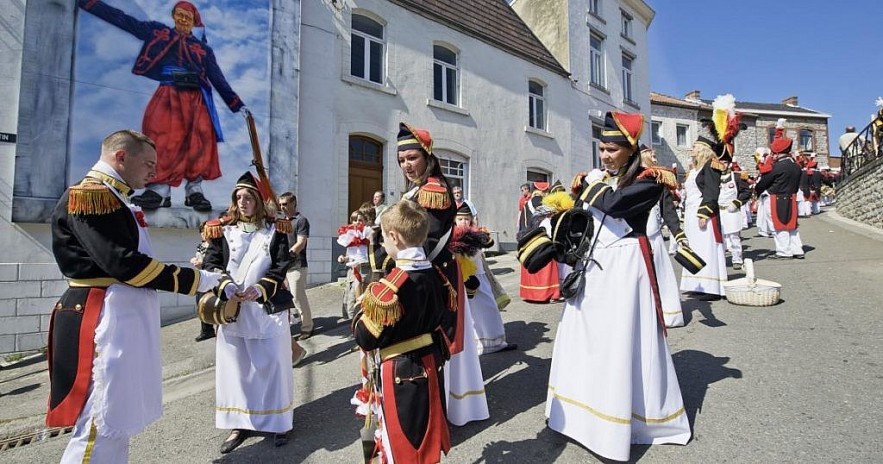 |
| Whit Sunday in Poland |
Polish public holiday Whit Sunday, also known as Pentecost or the Descent of the Holy Spirit (Zeslanie Ducha Swietego), falls 7 weeks after Easter Sunday.
Since Pentecost is a Polish public holiday, most businesses will be closed. The seventh Sunday and Monday after Easter are observed, with the Monday off for a long weekend. Easter makes the date flexible, but it falls in mid-May to early June.
Some aspects of the ancient pagan festival are still observed during Pentecost, but others have faded. These were fertility rituals and spring celebrations.
Some decorate with flowers and green branches, especially birch branches. They may also "clean" their house with a birch-branch broom. Also, walk with a long branch with flowers and ribbons, walk through fields with torches “to drive away evil spirits,” or have huge bonfires. Also, cattle heads are wreathed in flowers and greenery.
Polish churches celebrate the Spirit's descent and Church empowerment with special services. Some swing a carved wooden dove around the congregation to symbolize the Spirit's descent. Doves, fire, and wind are common Spirit symbols. Due to the 3,000 new converts baptized on the first Day of Pentecost almost 2,000 years ago, Pentecost baptisms are also common.
Events
Many people also use Pentecost's day off from work to have a family picnic in the countryside. During Pentecost, travelers visiting Poland might want to partake in any of the following activities:
The pristine Bialowieza Forest National Park wilderness reserve has a Polish spring. Besides the pygmy owl, hundreds of European bison and birds are visible. You can take a guided walking, biking, or horse-drawn carriage tour.
Play local “hunting the green man” games. The pagan game is still played at Pentecost. A man dressed in leaves and moss hides in the woods, and kids play hide-and-seek with him.
Pentecost services and stunning architecture are available at Poland's great cathedrals. Consider the Romanesque Plock Cathedral, the Baroque Field Cathedral of the Polish Army in Warsaw, the Gothic Saint Nicholas Cathedral in Elblag, and Gorzow's mixed Romanesque and Gothic Saint Mary's Cathedral.
Pentecost in Poland involves a mix of Christian and ancient pagan Slavic traditions, along with the simple desire to get out and enjoy the spring weather.
Corpus Christi
June 19, 2025, Public Holiday
Corpus Christi is an annual public holiday in Poland on the Thursday of the ninth week after Easter.
Corpus Christi, Latin for “body of Christ,” refers to priests' communion bread. Despite communion being served every Sunday during mass, a special day was established to commemorate Saint Julianne's visions in Liege in 1247. Polish Corpus Christi celebrations began in 1320.
Corpus Christi is celebrated on the Thursday of the ninth week after Easter Sunday. For a festive four-day weekend, many Poles take off Corpus Christi and the following Friday.
Corpus Christi is one of five days a year Catholic bishops cannot leave their dioceses unless necessary. Special Eucharistic masses are held on this day. The immediate processions after mass are the main focus. Banner-bearing Polish devotees march through the streets. As the priest walks with a canopy-covered Eucharist, children throw flowers in his path. When the procession stops at four altars, crowds sing hymns and pray. The procession returns to the church, where the priest blesses the Eucharist.
Poles may decorate their windows with religious pictures or flower garlands for Corpus Christi. Each church in a large city has its own procession at different times of day, and streets are often lined with flowers and other decorations. Some believe Jesus walks on street flowers, and others tear twigs from street altars for "good luck".
Father's Day
Mon, Jun 23 Not A Public Holiday
Father's Day is all about celebrating the important role that dads and granddads play in our lives. So, it's a pretty modern holiday, but you know, the ancient Romans used to have this tradition of honoring fathers every February, but it was only for those who had passed away.
Father's Day is celebrated on various dates across the globe, but the way people celebrate is pretty similar. It often includes giving gifts to dads and enjoying some family activities together.
Assumption of Mary
August 15, 2025, Public Holiday
In Poland, August 15 is the Day of the Assumption, which is also called the Miracle on the Vistula. It is a national holiday.
In the Catholic faith, the Feast of the Assumption of Mary is a very important day. In some parts of Europe, it is even called the "Easter of the summer."
It is the main feast day for the Blessed Virgin Mary, who was the mother of Jesus Christ. It is also called the "Dormition of the Virgin Mary."
In places like Spain and Italy, it's the start of the summer break, when lots of people leave the cities to go on vacation to the coast or the hills. Around the world, people call it the "Feast of Our Lady of the Harvest" because of the date on the calendar.
On this day, people in Poland go to church, make pilgrimages to Marian shrines, and take part in religious processions. People take the day off to show their love for the Virgin Mary.
All Saints' Day
November 01, 2025, Public Holiday
All Saints’ Day is a public holiday in Poland on November 1 each year.
All Saints' Day ranks third in importance among Polish holidays, after Christmas and Easter. The holiday is celebrated as a joyful time for reflecting on life and celebrating the deceased, even though it focuses on those who have passed away.
On November 1st, Poles traditionally descend upon their ancestral graves, leaving floral arrangements as a token of their respect. This causes heavy traffic on the nation's highways. Traditional elements of the ceremony include chrysanthemums, candles, and wreaths placed at grave sites.
Many believe that they can aid the soul of the departed in its final redemption by leaving lights on a grave, decorating it, and praying for the person buried there.
On this day, Polish people attend special masses honoring all saints. That, along with the holiday's fundamental meaning, causes many to think back on the last year and the lives of their ancestors and other loved ones who have passed on. On top of that, Polish All Saints' Day is a chance to remember the fallen, especially those from World War II.
Independence Day
November 11, 2025, Public Holiday
National Independence Day is an annual public holiday in Poland on November 11 to commemorate the country’s independence in 1918.
In Poland, Independence Day also celebrates the escape of Poland from foreign domination in 1918.
Prussia (Germany), Russia, and Austria-Hungary "gobbled up" Polish territory for decades until Poland became an independent nation. However, all three powers lost in World War I, and Austria-Hungary was shattered forever. It took time, but Poland became independent.
The first Polish independence commission was formed in Krakow on October 28, 1918. They soon retook Galicia and Silesia from Austria. November 6 and 7 saw the establishment of a temporary capital and interim government in Lublin. On November 10, Jozef Pilsudski, their future president, was released from a Prussian prison and arrived in Warsaw to cheers. On November 11, he took control of the interim government and called for elections.
November 11th became Independence Day in 1937 and was only observed twice before the Nazi invasion in 1939. Even though the Communist, Soviet-backed Polish government shunned it after World War II, the people celebrated it many times. The pre-war Polish government, which had fled to London after the Nazis and Soviets divided Poland in 1939, was declared invalid, and November 11th celebrations were replaced by July 22, 1944, PKWN Manifesto commemorations. That manifesto stated the Soviet intention to establish a new Polish government and overthrow the exiled government.
After Poland's Communism collapsed in 1989, November 11th became Independence Day again, and it has been celebrated ever since. Poland has many family gatherings, fireworks displays, patriotic concerts and events, and special church services where Poles pray for their country's future on this day off.
Christmas Day
December 25, 2025, Public Holiday
Christmas Day is a public holiday in Poland on December 25 each year.
Poland celebrates Christmas as “Boze Narodzenie” (“God's Birth”) after Christ's birth.
Over 88% of Poland's 40 million people are Roman Catholic, so Christmas is deeply Catholic. Polish Christmas traditions have evolved over the last 1,000 years, some dating back to pre-Christian times.
Polish Christmas preparation begins a month before Christmas on Advent, the liturgical year's beginning. As Christmas approaches, people avoid overeating and entertainment and focus on its meaning. The Virgin Birth announcement to Mary is commemorated with special masses. Preparing for the day involves cleaning houses.
Nativity plays will be performed in schools near Christmas. Some secularized plays set the story in the 21st century. Polish people fast from meat on Christmas Eve and clean their homes and wear Christmas clothes.
Late on Christmas Eve, after the first star appears, the long-awaited “Christmas Eve Dinner” is served. Traditional meals begin with a wafer with a picture of Jesus, Mary, and Joseph passed around and eaten until it's gone. Straw can be scattered on the floor to symbolize Jesus' birth stable. You are expected to try all 12 dishes on the table, which are supposed to bring good luck for the next year.
After dinner, the family sings Christmas carols and opens presents. Adults often linger at the table and sing festively to tease impatient children. Santa brings gifts in many parts of Poland, but “the Star Man” does in others. Star Man is harsher than Santa because he leaves birchwood switches for bad kids.
The Christmas tree will be up on Christmas Eve. It will have a star on top and lights, “bombki” glass baubles, and gingerbread below. After all the festivities, Polish Catholics attend midnight mass to await Christmas morning.
Second Day of Christmas, St Stephen’s Day or Holy Szczepan
December 26, 2025, Public Holiday
Boxing Day, also known as St Stephen’s Day or Holy Szczepan, is a public holiday in Poland on December 26 each year.
In commonwealth countries, the day after Christmas day is a holiday but known as Boxing Day. In some countries, the day after Christmas Day may also be known as the 'Second Day of Christmas' or the 'Day after Christmas'.
National Day of the Victorious Greater Poland Uprising
December 27, 2025, Observances
National Day of the Victorious Greater Poland Uprising is not a public holiday. Businesses have normal opening hours.
New Year’s Eve
December 31, 2025, Observances
New Year’s Eve is a joyous celebration that takes place in Poland on December 31. The day before New Year’s Day marks the final day of the year in the Gregorian calendar.
In Poland, New Year's Eve is not recognized as a public holiday. Businesses operate during standard opening hours.
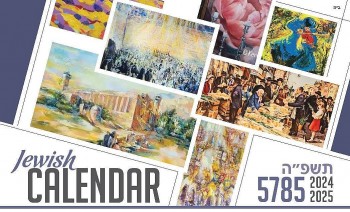 2025 Jewish Calendar: Important Dates, Holidays, Observances and Celebrations 2025 Jewish Calendar: Important Dates, Holidays, Observances and Celebrations Check out the full list of the Jewish holidays in 2025 and the most popular festivals and celebrations. |
 2025 Islamic Calendar: Important Dates, Holidays, Observances and Celebrations 2025 Islamic Calendar: Important Dates, Holidays, Observances and Celebrations Let's explore the full list of the 2025 Islam calendar including observations, religious days, holidays, and popular celebrations. |
 2025 Julian Calendar: Important Dates, Holidays, Observances and Celebrations 2025 Julian Calendar: Important Dates, Holidays, Observances and Celebrations The Julian calendar is a solar calendar introduced by Julius Caesar in 45 BCE, aiming to align the calendar year with the solar year. Here’s ... |
 2025 Gregorian Calendar: Important Dates, Holidays, Observances and Celebrations 2025 Gregorian Calendar: Important Dates, Holidays, Observances and Celebrations As we step into 2025, it's essential to mark our calendars with key dates, holidays, and observances that shape our year. This guide will help ... |


